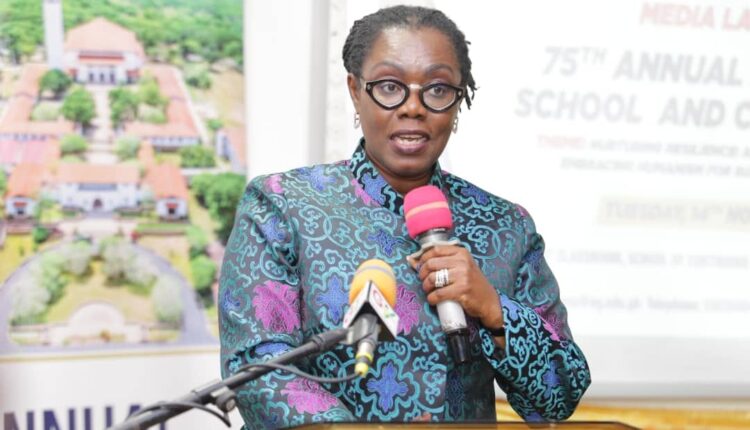The Minister for Communications and Digitalization, Mrs. Ursula Owusu-Ekuful has disclosed government’s intentions to construct a digital Youth Village at the university of Ghana, Legon, with the aim of promoting sustainable learning experience and empower the youth with modern technology for innovation and digital transformation.
The Minister said although, there is a delay to construct the infrastructure, resources have now been mobilized and a consensus established with relevant stakeholders to enroll the project.
According to her, gender disparities is a critical issue contributing negatively towards significant strides by government to advance technology and innovation in the country however the mini technology project will serve as a catalyst for change.
The Minister said this when delivering a keynote address at the launch of 75th annual new year school and conference which brought together stakeholders from academia, business and political leadership to discuss issues of national significance as well as inform policy decisions for sustainable growth.
“We are also working with the Ministry of finance to build a Digital Youth Village for the New Year School of the University of Ghana and I believe we are ready to break ground on this shortly. The architectural drawings are ready; a contractor has been approved by the PPA and funding secured” she said.
She added, “With all these digital initiatives underway, we have to step up efforts to secure the digital ecosystem as well and prioritize cyber security. GHANA is one of only 3 African countries which have ratified both the Budapest Convention on cybercrime and electronic evidence and the AU convention on cybersecurity and personal data protection, the Malabo Convention. The passage of the Cyber Security Act demonstrates government’s commitment to the protection of both infrastructure and transactions. It is therefore not surprising that ECOWAS has appointed Ghana as the cybersecurity champion for the region in view of our modest efforts.
“We are also prioritizing data protection and held the first African regional privacy and data protection conference in GHANA in June 2019. We are hosting the first global conference on cyber capacity building in Accra on 29-30 November, 2023. It is being organised by the Global Forum for Cyber expertise, World Bank, World Economic Forum and Cyber Peace Institute. It is a testament to the strides made in the area of ICT in general and cybersecurity in particular that Ghana has been chosen to host this seminal conference.”
Mrs. Owusu-Ekuful further highlighted the University’s proactive adaptation to Information and Communication Technologies (ICTs), noting its pioneering efforts in campus radio, fiber optic connectivity, and responsible communications tower installation.
She emphasized the necessity of integrating ICTs into distance learning, especially in the post-COVID era of blended education.
“ICTs are transforming various sectors, creating more robust, developed, and inclusive economies. Recognizing ICT as a pivotal tool for socio-economic development, the Ghanaian government has launched extensive reforms in education and ICT sectors as part of its transformative agenda,” Mrs. Owusu-Ekuful remarked.
She also noted the government’s efforts in removing financial barriers to education, citing the Free Senior High School programme’s success in increasing student enrollment from 800,000 to 1.2 million.
The Minister elaborated on multiple projects aimed at formalizing the economy through technology, focusing on policy, regulation, infrastructure development, capacity building, data management, e-governance, the Ghana.gov digital platform, digital addressing system, e-passport initiatives, and cyber security.
She mentioned the “Smart Community Project,” which aims to provide affordable or free Wi-Fi services to underserved communities, and a Rural Telephony Project, which seeks to expand mobile and data services nationwide by year-end.
Mrs. Owusu-Ekuful stressed that the conference’s theme aligns with the government’s vision of enhancing resilience, adopting technology, and achieving key Sustainable Development Goals.
She underscored the importance of investing in research in Artificial Intelligence (AI) and supporting educational institutions in integrating digital tools across all academic levels and programs.
Prof. Samuel Nii Ardey Codjoe, Provost of the College of Education at the University of Ghana, on his part remarked that the DYV will set national standards and foster business and competition. He emphasized its role in nurturing digital entrepreneurial talent with a global perspective, facilitating access to markets, capital, talent, and resources essential for success in Ghana’s digital economy.
Prof. Codjoe outlined the conference’s objectives, which include enhancing public participation in governance, adopting technology and humanism for sustainable development, leveraging the digital economy for growth, and discussing strategies for overcoming challenges in nurturing resilience.


Comments are closed.